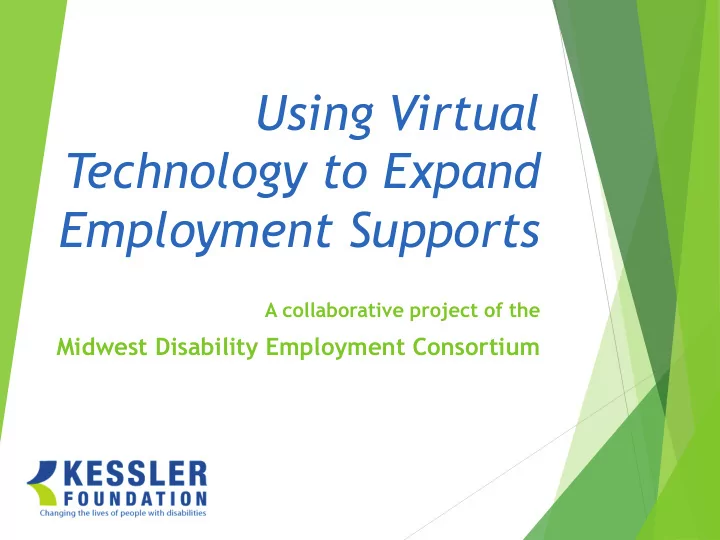

Using Virtual Technology to Expand Employment Supports A collaborative project of the Midwest Disability Employment Consortium
Welcome Overview Application in 3 States Outcomes & Lessons Learned Policy & Practice Implications Questions & Discussion
SUPPORTED EMPLOYMENT I V Assessment/ Fading/ Discovery On-Going Support II IV Job Job Development Training III Customized Job Placement
People with disabilities are disproportionately un- and underemployed The U.S. is facing a workforce shortage crisis, Needs particularly in rural areas Job coaches want and need training, support and resources Job seekers lack access to behavioral supports
Technology can be used to address common service delivery issues Follow-up supports and crisis Innovation intervention Train, support and retain quality job coaches Expand availability of behavioral supports
A regional approach The Midwest Disability Employment Consortium aims Founding State / University Partners to be venue for Iowa (University of Iowa) promoting South Dakota (University of system change South Dakota) and scaling up of Nebraska (University of Nebraska) innovative and Expanded State/University best practices. Partners Illinois, Indiana, Kansas, Minnesota, Missouri, North Dakota, and Ohio
Population Served: Year 1 (Pilots in IA, NE, SD only) 29 Job Seekers 12 Community 32 Employment and Workers Provider Support with IDD and/or Agencies Specialists MH Challenges
Iowa Job coaching and crisis intervention services provided via technology to employers and supported employees in both rural and urban areas Identified appropriate iPad applications to facilitate long-term employment supports and crisis intervention services in the workplace Provided training and ongoing supports to job coaches and supported workers Tested and evaluated the impact of intervention
Iowa outcomes Who initiated contact
Iowa outcomes Type and intensity of contact
Reasons for on-site follow up: Medical Uploading updates and information on iPad Training on use of new apps “Regular” coaching visits Iowa outcomes Follow-up required?
“I feel that using this tool is allowing [participant] to become more independent at work.” Job coach feedback “She really liked using the iPad and even uses it as an alarm to wake her up for work and to contact her transportation staff.”
“Mickey” Employer was concerned with a perceived drop off in productivity (amount of time it was taking to complete cleaning/stocking of rooms) Used iPad to track time spent per room. Used baseline data collected to facilitate discussion with manager who affirmed the times were consistent with their expectations for productivity. “Due to being able to provide real data collected today, the employer revised their previous concerns regarding the client’s productivity.”
South Dakota Texting supports for job coaches Technical Assistance Immediate problem solving Brainstorming Information/Resources Sharing ideas Support
South Dakota Activities 53 individual and group texts Pre-placement issues Job development Job site problems Facilitated by: Relationship building, Initiation of resource sharing Group community of practice
“I loved having other people in my South Dakota field at my fingertips…” Outcomes “Different points of view and ideas from live people…” People with disabilities “…utilizing collective 7 employed, 2 first time knowledge of 20 hours, $9.77 hour everyone…” Job coaches “Networking and identifying Increased competencies resources and Greater satisfaction options.” “Being able to apply advice right away.”
South Dakota Benefits More support to Use of phone vs. the people Great tool website or supported in the email community Help serving Ideas to build Assists with job more difficult off in poverty coach shortages clients income areas Expand to see Receipt of something that support at time Easy and quick may be needed overlooked
South Dakota Impact & Next Steps Do you feel his would be a possible option for your organization? Expand year 1 pilot Replicate & evaluate efficacy Model development & capacity building
South Dakota “…client will have a phone interview. Has fear How it works of phone. Any tricks to phone interviews for people with cognitive disabilities?”
Nebraska Using technology to offer behavioral supports to help people with disabilities obtain and/or maintain employment Provided technical assistance to job coaches and employment teams via virtual technology platforms using a Board-Certified Behavior Analyst (BCBA) Increased job coach engagement by including behavioral supports in the plan
Nebraska GoPro Hero’s used to collect participant data at actual jobsite
Decreased inappropriate behaviors Nebraska Increased job coach awareness of outcomes available behavioral health services Clarified policy affording greater flexibility in funding to utilize concurrent DD and MH services
Challenges experienced Addressing the culture Technology challenges change in the workplace (e.g., accessing WiFi, to make the use of lack of familiarity/ technology a standard comfort, “forgetting”) operating procedure Evaluating both the process and the outcome
Sustainability Ongoing access to training and technical assistance (keeping up with the pace of technology) Opportunities for sharing information is vital to problem solving Developing and maintaining relationships with job coaches is essential
Service Delivery & Policy Implications Funding rates and procedures Provisions for training Access and referral processes Measuring outcomes Oversight and management Other
Julie Christensen julie@apse.org Thank Wendy Parent-Johnson wparentjohnson@email.arizona.edu you! Questions and Discussion Wayne Stuberg wstuberg@unmc.edu Elaine Katz ekatz@kesslerfoundation.org
Recommend
More recommend